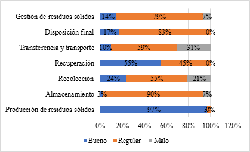Solid waste management system based on methods to improve the management of household waste
DOI:
https://doi.org/10.51252/reacae.v2i2.588Keywords:
household segregation, treatment, commercialization, recovery, recyclingAbstract
Inadequate management of household waste is a challenge in terms of public health and environmental protection. A management system based on solid waste methods is proposed as a solution to improve household waste management in Cuñumbuqui, Peru. A descriptive-propositive research was carried out with a sample of 29 employees who responded to a validated questionnaire to diagnose the problematic situation. Among the results, 59% of the collaborators considered that the management of household waste is bad, 34% mentioned that it is regular and only 7% expressed that it is good; and in relation to solid waste management, 14% indicated that it is good, 79% regular and only 7% expressed that it is bad; that is, that storage, transfer and transport, collection, recovery and final disposal are carried out regularly. It is concluded that the proposal is valid by the experts' judgment and presents characteristics of ecological integrality, interculturality and local articulation, which will help individuals to manage household waste in a responsible and adequate manner.
Downloads
References
Arellano G, D. M. (2013). Propuesta para la gestión integral de resíduos sólidos en el municipio Valera del Estado Trujillo [Tecana American University]. https://tauniversity.org/propuesta-para-la-gestion-integral-de-residuos-solidos-en-el-municipio-valera-del-estado-trujillo
Bao Ratzemberg, C. B., Alvarado, G. del P. P., Sánchez Dávila, K., Delgado Bardales, J. M., Contreras, R. M., & Palomino Alvarado, G. del P. (2021). Manejo integral de desechos domiciliarios para el desarrollo territorial, distrito de Shanao 2019. Ciencia Latina Revista Científica Multidisciplinar, 5(1), 689–705. https://doi.org/10.37811/cl_rcm.v5i1.271
Bracquené, E., Martinez, M. G., Wagner, E., Wagner, F., Boudewijn, A., Peeters, J., & Duflou, J. (2021). Quantifying the environmental impact of clustering strategies in waste management: A case study for plastic recycling from large household appliances. Waste Management, 126, 497–507. https://doi.org/10.1016/j.wasman.2021.03.039
Chen, D. M.-C., Bodirsky, B. L., Krueger, T., Mishra, A., & Popp, A. (2020). The world’s growing municipal solid waste: trends and impacts. Environmental Research Letters, 15(7), 074021. https://doi.org/10.1088/1748-9326/ab8659
Chikowore, N. (2021). Factors influencing household waste management practices in Zimbabwe. Journal of Material Cycles and Waste Management, 23(1), 386–393. https://doi.org/10.1007/s10163-020-01129-9
García Batista, R. M., Machado López, L., & Minuche, J. L. (2017). Plan de gestión ambiental de desechos sólidos en la Empresa productora de banano, Herederos Coronel, del Cantón Machala, Ecuador. Universidad y Sociedad, 9(1), 100–105. https://rus.ucf.edu.cu/index.php/rus/article/view/521
García Batista, R. M., Socorro Castro, A. R., & Maldonado, A. V. (2019). Manejo y gestión ambiental de los desechos sólidos, estudio de casos. Universidad y Sociedad, 11(1), 265–271. https://rus.ucf.edu.cu/index.php/rus/article/view/1121
Istrate, I.-R., Iribarren, D., Gálvez-Martos, J.-L., & Dufour, J. (2020). Review of life-cycle environmental consequences of waste-to-energy solutions on the municipal solid waste management system. Resources, Conservation and Recycling, 157, 104778. https://doi.org/10.1016/j.resconrec.2020.104778
Kaplan Mintz, K., Henn, L., Park, J., & Kurman, J. (2019). What predicts household waste management behaviors? Culture and type of behavior as moderators. Resources, Conservation and Recycling, 145, 11–18. https://doi.org/10.1016/j.resconrec.2019.01.045
Mendieta-Vivas, R. J., Giler-Sarmiento, J. A., Menéndez-Cevallos, C. Y., & Macías-Chila, R. R. (2020). Estudio sobre el manejo de desechos sólidos del órea urbana en la parroquia Membrillo, cantón Bolívar. Ciencias Técnicas y Aplicadas, 6(3). https://dominiodelasciencias.com/ojs/index.php/es/article/view/1285
Ochoa Chi, J. D. P. (2014). Los vertederos de basura y sus impactos socio ambientales en la población circunvecina. El caso del vertedero de Milpilla, Tetlama [Universidad Nacional Autónoma de México]. https://ru.dgb.unam.mx/handle/20.500.14330/TES01000710885
Pelayo Díaz, C., & Linazasoro Espinoza, I. (2020). El impacto climático de la basura: Análisis normativo de los residuos sólidos, la recuperación de suelos y la minería de rellenos sanitarios. Revista de Derecho Ambiental, 14, 71. https://doi.org/10.5354/0719-4633.2020.54151
Pujara, Y., Pathak, P., Sharma, A., & Govani, J. (2019). Review on Indian Municipal Solid Waste Management practices for reduction of environmental impacts to achieve sustainable development goals. Journal of Environmental Management, 248, 109238. https://doi.org/10.1016/j.jenvman.2019.07.009
Raza-Carrillo, D., & Acosta, J. (2022). Planificación ambiental y el reciclaje de desechos sólidos urbanos. Economía Sociedad y Territorio, 22(69), 519–544. https://doi.org/10.22136/est20221696
Xiao, S., Dong, H., Geng, Y., Tian, X., Liu, C., & Li, H. (2020). Policy impacts on Municipal Solid Waste management in Shanghai: A system dynamics model analysis. Journal of Cleaner Production, 262, 121366. https://doi.org/10.1016/j.jclepro.2020.121366
Yousefi, M., Oskoei, V., Jonidi Jafari, A., Farzadkia, M., Hasham Firooz, M., Abdollahinejad, B., & Torkashvand, J. (2021). Municipal solid waste management during COVID-19 pandemic: effects and repercussions. Environmental Science and Pollution Research, 28(25), 32200–32209. https://doi.org/10.1007/s11356-021-14214-9
Zhao, Y., Chang, H., Liu, X., Bisinella, V., & Christensen, T. H. (2022). Climate Change Impact of the Development in Household Waste Management in China. Environmental Science & Technology, 56(12), 8993–9002. https://doi.org/10.1021/acs.est.1c07921

Published
How to Cite
Issue
Section
License
Copyright (c) 2023 Andi Lozano-Chung, Carlos Mauricio Lozano-Carranza, Rodrigo David Colichón-Carranza

This work is licensed under a Creative Commons Attribution 4.0 International License.
The authors retain their rights:
a. The authors retain their trademark and patent rights, as well as any process or procedure described in the article.
b. The authors retain the right to share, copy, distribute, execute and publicly communicate the article published in the Revista Amazónica de Ciencias Ambientales y Ecológicas (REACAE) (for example, place it in an institutional repository or publish it in a book), with an acknowledgment of its initial publication in the REACAE.
c. Authors retain the right to make a subsequent publication of their work, to use the article or any part of it (for example: a compilation of their works, notes for conferences, thesis, or for a book), provided that they indicate the source of publication (authors of the work, journal, volume, number and date).



